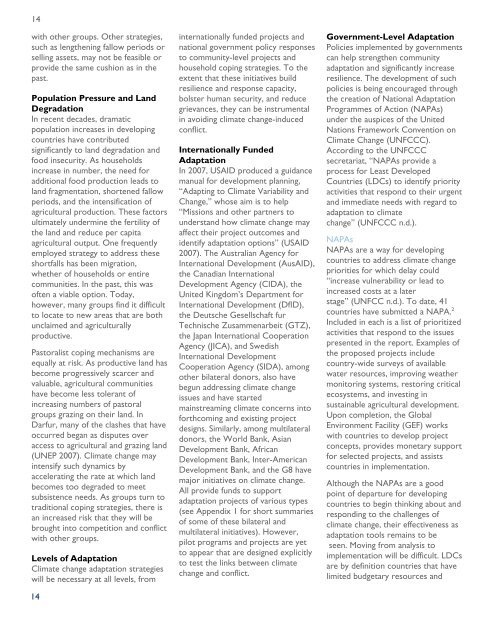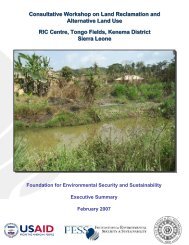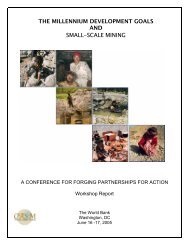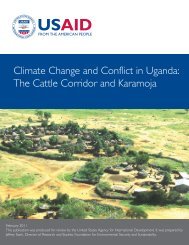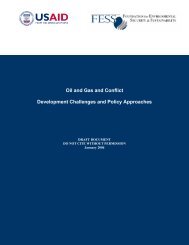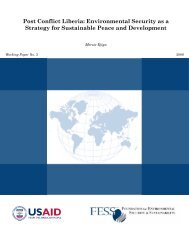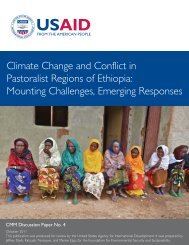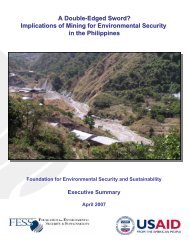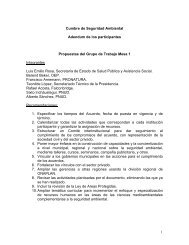Climate Change, Adaptation, and Conflict - FESS :: Foundation for ...
Climate Change, Adaptation, and Conflict - FESS :: Foundation for ...
Climate Change, Adaptation, and Conflict - FESS :: Foundation for ...
You also want an ePaper? Increase the reach of your titles
YUMPU automatically turns print PDFs into web optimized ePapers that Google loves.
14with other groups. Other strategies,such as lengthening fallow periods orselling assets, may not be feasible orprovide the same cushion as in thepast.Population Pressure <strong>and</strong> L<strong>and</strong>DegradationIn recent decades, dramaticpopulation increases in developingcountries have contributedsignificantly to l<strong>and</strong> degradation <strong>and</strong>food insecurity. As householdsincrease in number, the need <strong>for</strong>additional food production leads tol<strong>and</strong> fragmentation, shortened fallowperiods, <strong>and</strong> the intensification ofagricultural production. These factorsultimately undermine the fertility ofthe l<strong>and</strong> <strong>and</strong> reduce per capitaagricultural output. One frequentlyemployed strategy to address theseshortfalls has been migration,whether of households or entirecommunities. In the past, this wasoften a viable option. Today,however, many groups find it difficultto locate to new areas that are bothunclaimed <strong>and</strong> agriculturallyproductive.Pastoralist coping mechanisms areequally at risk. As productive l<strong>and</strong> hasbecome progressively scarcer <strong>and</strong>valuable, agricultural communitieshave become less tolerant ofincreasing numbers of pastoralgroups grazing on their l<strong>and</strong>. InDarfur, many of the clashes that haveoccurred began as disputes overaccess to agricultural <strong>and</strong> grazing l<strong>and</strong>(UNEP 2007). <strong>Climate</strong> change mayintensify such dynamics byaccelerating the rate at which l<strong>and</strong>becomes too degraded to meetsubsistence needs. As groups turn totraditional coping strategies, there isan increased risk that they will bebrought into competition <strong>and</strong> conflictwith other groups.Levels of <strong>Adaptation</strong><strong>Climate</strong> change adaptation strategieswill be necessary at all levels, from14internationally funded projects <strong>and</strong>national government policy responsesto community-level projects <strong>and</strong>household coping strategies. To theextent that these initiatives buildresilience <strong>and</strong> response capacity,bolster human security, <strong>and</strong> reducegrievances, they can be instrumentalin avoiding climate change-inducedconflict.Internationally Funded<strong>Adaptation</strong>In 2007, USAID produced a guidancemanual <strong>for</strong> development planning,“Adapting to <strong>Climate</strong> Variability <strong>and</strong><strong>Change</strong>,” whose aim is to help“Missions <strong>and</strong> other partners tounderst<strong>and</strong> how climate change mayaffect their project outcomes <strong>and</strong>identify adaptation options” (USAID2007). The Australian Agency <strong>for</strong>International Development (AusAID),the Canadian InternationalDevelopment Agency (CIDA), theUnited Kingdom’s Department <strong>for</strong>International Development (DfID),the Deutsche Gesellschaft furTechnische Zusammenarbeit (GTZ),the Japan International CooperationAgency (JICA), <strong>and</strong> SwedishInternational DevelopmentCooperation Agency (SIDA), amongother bilateral donors, also havebegun addressing climate changeissues <strong>and</strong> have startedmainstreaming climate concerns into<strong>for</strong>thcoming <strong>and</strong> existing projectdesigns. Similarly, among multilateraldonors, the World Bank, AsianDevelopment Bank, AfricanDevelopment Bank, Inter-AmericanDevelopment Bank, <strong>and</strong> the G8 havemajor initiatives on climate change.All provide funds to supportadaptation projects of various types(see Appendix 1 <strong>for</strong> short summariesof some of these bilateral <strong>and</strong>multilateral initiatives). However,pilot programs <strong>and</strong> projects are yetto appear that are designed explicitlyto test the links between climatechange <strong>and</strong> conflict.Government-Level <strong>Adaptation</strong>Policies implemented by governmentscan help strengthen communityadaptation <strong>and</strong> significantly increaseresilience. The development of suchpolicies is being encouraged throughthe creation of National <strong>Adaptation</strong>Programmes of Action (NAPAs)under the auspices of the UnitedNations Framework Convention on<strong>Climate</strong> <strong>Change</strong> (UNFCCC).According to the UNFCCCsecretariat, “NAPAs provide aprocess <strong>for</strong> Least DevelopedCountries (LDCs) to identify priorityactivities that respond to their urgent<strong>and</strong> immediate needs with regard toadaptation to climatechange” (UNFCCC n.d.).NAPAsNAPAs are a way <strong>for</strong> developingcountries to address climate changepriorities <strong>for</strong> which delay could“increase vulnerability or lead toincreased costs at a laterstage” (UNFCC n.d.). To date, 41countries have submitted a NAPA. 2Included in each is a list of prioritizedactivities that respond to the issuespresented in the report. Examples ofthe proposed projects includecountry-wide surveys of availablewater resources, improving weathermonitoring systems, restoring criticalecosystems, <strong>and</strong> investing insustainable agricultural development.Upon completion, the GlobalEnvironment Facility (GEF) workswith countries to develop projectconcepts, provides monetary support<strong>for</strong> selected projects, <strong>and</strong> assistscountries in implementation.Although the NAPAs are a goodpoint of departure <strong>for</strong> developingcountries to begin thinking about <strong>and</strong>responding to the challenges ofclimate change, their effectiveness asadaptation tools remains to beseen. Moving from analysis toimplementation will be difficult. LDCsare by definition countries that havelimited budgetary resources <strong>and</strong>


